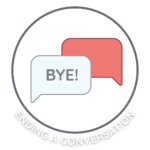
Conversations are the building blocks of social interaction. For elementary school students, especially those with social communication difficulties, recognizing when a conversation is coming to an end can sometimes be challenging. As speech-language pathologists, it’s our job to equip these learners with the skills they need to navigate social situations confidently. This blog post will delve into a lesson plan complete with simple, no-prep activity ideas focused on a free downloadable PDF worksheet – Knowing When the Conversation is Over Practice.
Why It’s Important to Know When a Conversation is Ending
Before diving into the lesson plan, let’s understand why it’s beneficial for students to learn this skill. Recognizing the end of a conversation helps in:
- Ensuring both parties feel the interaction was meaningful and comfortable.
- Ending conversations positively can make future interactions more pleasant.
- It teaches students to be attentive and responsive to verbal and non-verbal cues.
Lesson Plan Overview
This lesson plan is structured around a worksheet activity where students will match four skills to corresponding scenarios. The activity is designed to be engaging and insightful, helping students grasp the nuances through practical examples.
Objectives:
- Students will learn to identify verbal and non-verbal cues indicating a conversation is ending.
- Students will understand the importance of clear communication in social interactions.
Materials Needed:
- Knowing When the Conversation is Over free PDF worksheet
- Pens or pencils
- Scenario cards (optional for extension activities)
Activity Steps:
- Introduction (5 minutes): Start with a group discussion on how it feels when someone doesn’t realize you’re trying to end a conversation. Highlight the importance of paying attention to clues that suggest the conversation is winding down.
- Worksheet Activity (10 minutes): Distribute the worksheets. Each worksheet will have four sections, each dedicated to one of the key skills:
- Paying attention to cluesListening for conversation-ending phrasesAsking directly if the conversation is endingEnding positively
- Group Discussion (5 minutes): After completing the worksheets, facilitate a discussion where students can share their answers and reasoning. This will help reinforce the concepts and allow for peer learning.
- Role-Playing (10 minutes): In small groups, students can pick scenarios and role-play them, practicing how to end conversations using the skills they’ve learned. Rotate roles so each student gets a chance to practice ending a conversation.
- Reflection (5 minutes): Conclude the lesson with a reflection session. Ask students to think of a time when they could have used one of these skills and share how they might handle a similar situation in the future.
Conclusion
Teaching elementary school students to recognize when a conversation is over is an essential social skill. By focusing on verbal and non-verbal cues, practicing through role-play, and encouraging direct communication, SLPs can help students navigate social interactions more effectively. Remember, the goal is not just to teach a skill but to foster confidence and empathy in young communicators. With these simple, no-prep activities, your students will be well on their way to mastering the art of conversation.
Sample Video
Students learn best from watching real students their own age model skills. Try out this sample video-modeling lesson below. We offer our entire Social-Emotional Learning platform free for 30 days here!
Related Blog Posts:
Teaching Direct and Indirect Language Skills to Elementary Students
Teaching Elementary Students to Understand and Manage Their Feelings









